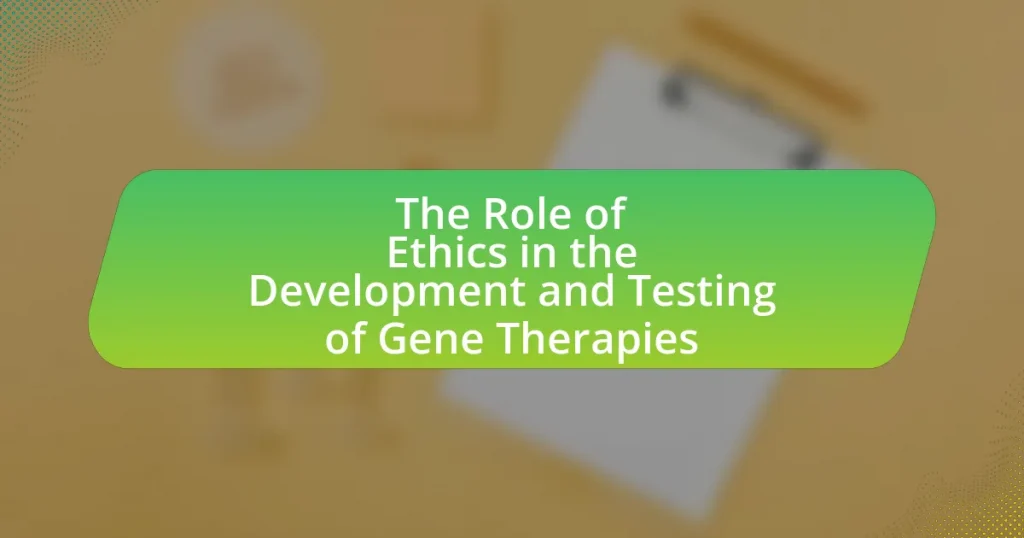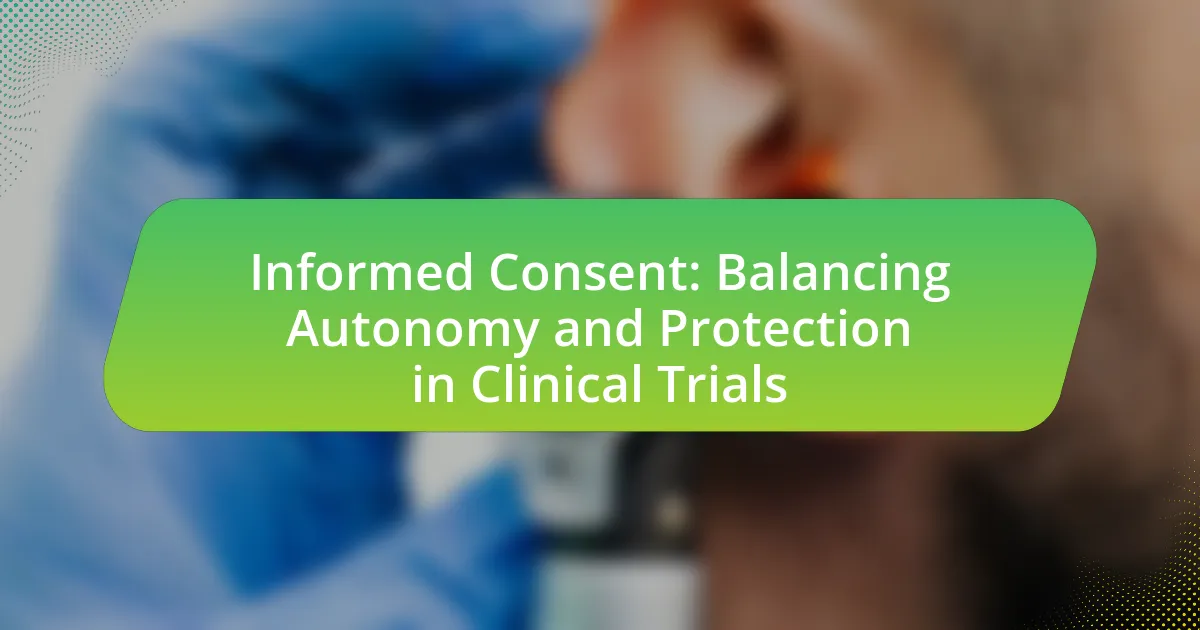The article examines the critical role of ethics in the development and testing of gene therapies, emphasizing the importance of patient safety, informed consent, and equitable access. It outlines key ethical principles such as respect for autonomy, beneficence, non-maleficence, and justice, which guide research practices and address potential dilemmas like genetic discrimination and long-term effects of gene editing. Additionally, the article discusses the influence of regulatory frameworks and governmental agencies on ethical standards, the impact of public perception on gene therapy acceptance, and best practices for ensuring transparency and informed consent in clinical trials.

What is the Role of Ethics in the Development and Testing of Gene Therapies?
Ethics plays a crucial role in the development and testing of gene therapies by ensuring that research is conducted responsibly, prioritizing patient safety, informed consent, and equitable access. Ethical guidelines help to navigate complex issues such as the potential for genetic discrimination, the long-term effects of gene editing, and the implications of altering human DNA. For instance, the Belmont Report outlines principles of respect for persons, beneficence, and justice, which are foundational in guiding ethical research practices. Additionally, regulatory bodies like the FDA and EMA enforce ethical standards to protect participants in clinical trials, ensuring that gene therapies are both safe and effective before they reach the market.
Why is ethics important in gene therapy development?
Ethics is crucial in gene therapy development because it ensures the protection of patients’ rights and safety. Ethical considerations guide researchers in obtaining informed consent, minimizing risks, and ensuring equitable access to therapies. For instance, the Belmont Report outlines principles such as respect for persons, beneficence, and justice, which are foundational in biomedical research. Adhering to these ethical standards helps prevent exploitation and promotes trust in scientific advancements, ultimately leading to responsible innovation in gene therapy.
What ethical principles guide gene therapy research?
Ethical principles guiding gene therapy research include respect for autonomy, beneficence, non-maleficence, and justice. Respect for autonomy emphasizes informed consent, ensuring that participants understand the risks and benefits of the therapy. Beneficence requires that researchers aim to maximize benefits while minimizing harm to patients. Non-maleficence mandates that researchers avoid causing harm, particularly in vulnerable populations. Justice involves equitable access to gene therapies and fair distribution of research benefits. These principles are foundational in ensuring ethical conduct in gene therapy research, as outlined in the Belmont Report, which provides a framework for ethical research involving human subjects.
How do ethical considerations impact patient consent?
Ethical considerations significantly impact patient consent by ensuring that patients are fully informed and able to make autonomous decisions regarding their treatment. In the context of gene therapies, ethical principles such as respect for autonomy, beneficence, and non-maleficence guide the consent process, requiring clear communication about potential risks, benefits, and alternatives. For instance, the Belmont Report emphasizes the necessity of informed consent in research involving human subjects, highlighting that patients must understand the implications of their participation. This ethical framework not only protects patient rights but also fosters trust in the healthcare system, ultimately influencing the willingness of patients to engage in innovative treatments like gene therapies.
What are the potential ethical dilemmas in gene therapy?
Potential ethical dilemmas in gene therapy include issues of consent, equity, and long-term effects. Informed consent is critical, as patients must fully understand the risks and benefits before undergoing treatment. Equity concerns arise regarding access to gene therapies, which may be prohibitively expensive, potentially widening health disparities. Additionally, the long-term effects of gene therapy are uncertain, raising questions about unintended consequences on future generations. These dilemmas highlight the need for robust ethical frameworks to guide the development and application of gene therapies.
How do we address the risks of genetic discrimination?
To address the risks of genetic discrimination, implementing robust legal protections and ethical guidelines is essential. Legislation such as the Genetic Information Nondiscrimination Act (GINA) in the United States prohibits discrimination based on genetic information in health insurance and employment. Additionally, ethical frameworks must be established to guide the responsible use of genetic data, ensuring that individuals’ genetic information is kept confidential and used solely for intended purposes. These measures collectively help mitigate the potential for discrimination based on genetic predispositions, fostering a more equitable environment in healthcare and employment settings.
What are the implications of gene editing on future generations?
Gene editing has significant implications for future generations, primarily affecting genetic diversity, disease prevention, and ethical considerations. The ability to edit genes can lead to the eradication of hereditary diseases, potentially reducing the prevalence of conditions such as cystic fibrosis and sickle cell anemia in subsequent generations. For instance, the CRISPR-Cas9 technology has demonstrated success in correcting genetic mutations in laboratory settings, indicating a pathway to healthier future populations.
However, gene editing also raises ethical concerns regarding consent, equity, and unintended consequences. Future generations cannot consent to the genetic modifications made by their ancestors, which poses moral dilemmas about autonomy and rights. Additionally, the potential for creating socioeconomic disparities, where only certain groups can access advanced gene editing technologies, could exacerbate existing inequalities.
Moreover, the long-term effects of gene editing on genetic diversity remain uncertain. Reducing genetic variation could make populations more susceptible to diseases, as seen in agricultural practices where monocultures lead to vulnerability. Therefore, while gene editing holds promise for improving health outcomes, it necessitates careful ethical considerations to ensure that its application benefits all of humanity without compromising future generations’ rights and genetic integrity.

How do regulatory frameworks influence ethical practices in gene therapy?
Regulatory frameworks significantly influence ethical practices in gene therapy by establishing guidelines that ensure safety, efficacy, and ethical considerations in research and clinical applications. These frameworks, such as the FDA regulations in the United States and the EMA guidelines in Europe, mandate rigorous preclinical and clinical testing, informed consent processes, and post-market surveillance, which collectively promote ethical standards. For instance, the FDA’s requirement for Institutional Review Boards (IRBs) to oversee clinical trials ensures that participant rights and welfare are prioritized, thereby reinforcing ethical practices in gene therapy development.
What role do governmental agencies play in gene therapy ethics?
Governmental agencies play a crucial role in gene therapy ethics by establishing regulations and guidelines that ensure the safety, efficacy, and ethical conduct of gene therapy research and applications. These agencies, such as the U.S. Food and Drug Administration (FDA) and the European Medicines Agency (EMA), assess the ethical implications of gene therapies, including informed consent, risk-benefit analysis, and equitable access to treatments. For instance, the FDA’s guidance documents outline ethical considerations for clinical trials, emphasizing the need for transparency and participant protection. This regulatory framework is essential for maintaining public trust and ensuring that gene therapies are developed responsibly and ethically.
How do regulations ensure patient safety in gene therapy trials?
Regulations ensure patient safety in gene therapy trials by establishing stringent guidelines that govern trial design, conduct, and oversight. These regulations require comprehensive preclinical testing to assess safety and efficacy before human trials can begin, as mandated by agencies such as the U.S. Food and Drug Administration (FDA) and the European Medicines Agency (EMA). Additionally, regulations enforce informed consent processes, ensuring that participants are fully aware of potential risks and benefits. Continuous monitoring of trial data is also mandated, allowing for the identification and mitigation of adverse effects in real-time. For instance, the FDA’s Risk Evaluation and Mitigation Strategies (REMS) program is designed to manage known or potential serious risks associated with a drug. These regulatory frameworks collectively enhance patient safety by ensuring that gene therapy trials are conducted ethically and responsibly.
What are the challenges in enforcing ethical standards in gene therapy?
Enforcing ethical standards in gene therapy faces significant challenges, primarily due to the rapid pace of technological advancement and the complexity of genetic manipulation. Regulatory bodies often struggle to keep up with innovations, leading to gaps in oversight. For instance, the lack of universally accepted guidelines can result in inconsistent ethical practices across different countries and institutions. Additionally, the potential for unintended consequences, such as off-target effects or long-term health impacts, complicates ethical assessments. The case of CRISPR technology illustrates this, as its use in human embryos raised ethical concerns about designer babies and genetic equity. Furthermore, the involvement of diverse stakeholders, including patients, researchers, and policymakers, can create conflicting interests that hinder consensus on ethical standards.
How do international guidelines shape ethical considerations in gene therapy?
International guidelines shape ethical considerations in gene therapy by establishing frameworks that ensure safety, efficacy, and respect for human rights. These guidelines, such as those from the World Health Organization and the International Society for Stem Cell Research, provide standards for informed consent, risk assessment, and equitable access to therapies. For instance, the WHO’s guidelines emphasize the importance of transparency and public engagement in gene therapy research, which helps to address ethical concerns related to potential misuse and societal implications. By adhering to these international standards, researchers and practitioners can navigate complex ethical landscapes, ensuring that gene therapy advancements align with global ethical norms and protect patient welfare.
What are the differences in ethical standards across countries?
Ethical standards vary significantly across countries, influenced by cultural, legal, and social factors. For instance, in the United States, ethical guidelines for gene therapy emphasize individual autonomy and informed consent, as outlined by the National Institutes of Health. In contrast, European countries often prioritize collective welfare and regulatory oversight, leading to stricter regulations on gene editing practices, as seen in the European Union’s General Data Protection Regulation. Additionally, countries like China have been noted for their rapid advancements in gene therapy research, but ethical oversight may be less stringent, raising concerns about safety and ethical implications. These differences highlight the complex landscape of ethical standards in gene therapy development and testing globally.
How do global collaborations address ethical issues in gene therapy?
Global collaborations address ethical issues in gene therapy by establishing international guidelines and frameworks that promote responsible research practices. These collaborations, such as the International Society for Stem Cell Research and the World Health Organization, facilitate dialogue among scientists, ethicists, and policymakers to ensure that gene therapy research adheres to ethical standards. For instance, the 2016 International Summit on Human Gene Editing resulted in a consensus statement emphasizing the need for oversight and ethical considerations in gene editing technologies. This collective approach helps to harmonize regulations across countries, ensuring that ethical concerns, such as informed consent and equitable access, are consistently addressed in gene therapy research and applications.

What are the implications of ethics on public perception of gene therapies?
Ethics significantly influences public perception of gene therapies by shaping trust and acceptance. Ethical concerns, such as the potential for genetic discrimination, the implications of “designer babies,” and the long-term effects on human genetics, can lead to skepticism and fear among the public. For instance, a survey conducted by the Pew Research Center in 2018 found that 49% of Americans expressed concern about the ethical implications of gene editing technologies. This indicates that ethical considerations directly impact how gene therapies are viewed, affecting their adoption and regulatory support.
How does public understanding of ethics affect gene therapy acceptance?
Public understanding of ethics significantly influences gene therapy acceptance by shaping perceptions of its safety, efficacy, and moral implications. When the public comprehends ethical considerations, such as informed consent and potential risks, they are more likely to support gene therapy initiatives. For instance, surveys indicate that individuals who are well-informed about the ethical frameworks surrounding gene therapy demonstrate higher levels of trust in the technology and its applications. This correlation is evident in studies showing that communities engaged in discussions about ethical issues related to gene therapy exhibit greater willingness to participate in clinical trials. Thus, enhanced public understanding of ethics directly correlates with increased acceptance of gene therapy.
What role does media play in shaping perceptions of gene therapy ethics?
Media significantly influences public perceptions of gene therapy ethics by framing narratives, disseminating information, and highlighting ethical dilemmas. Through news coverage, documentaries, and social media, media outlets shape how audiences understand the benefits and risks associated with gene therapy, often emphasizing emotional stories that resonate with the public. For instance, coverage of high-profile cases, such as the use of CRISPR technology in human embryos, raises ethical questions about consent and potential long-term consequences, thereby guiding public discourse. Research indicates that media representation can lead to polarized views, with some individuals expressing strong support for gene therapy based on positive portrayals, while others may develop skepticism due to concerns raised in critical reporting. This dual role of media as both an educator and a potential source of misinformation underscores its critical position in shaping ethical perceptions surrounding gene therapy.
How can education improve public awareness of ethical issues in gene therapy?
Education can improve public awareness of ethical issues in gene therapy by providing comprehensive information about the implications, risks, and benefits associated with these technologies. Structured educational programs, such as workshops, seminars, and online courses, can facilitate understanding of complex ethical dilemmas, including consent, equity, and potential long-term effects on individuals and society. Research indicates that informed communities are better equipped to engage in discussions and decision-making regarding gene therapy, as evidenced by studies showing that public forums increase knowledge and reduce misconceptions about genetic interventions. By fostering critical thinking and ethical reasoning, education empowers individuals to navigate the moral landscape of gene therapy effectively.
What best practices can be implemented to uphold ethics in gene therapy?
To uphold ethics in gene therapy, best practices include obtaining informed consent, ensuring equitable access, and conducting thorough risk assessments. Informed consent requires clear communication about the risks, benefits, and alternatives to gene therapy, allowing patients to make educated decisions. Equitable access ensures that all populations, regardless of socioeconomic status, can benefit from advancements in gene therapy, addressing disparities in healthcare. Thorough risk assessments involve evaluating potential long-term effects and unintended consequences of gene modifications, which is essential for patient safety and public trust. These practices are supported by guidelines from organizations such as the World Health Organization and the National Institutes of Health, which emphasize ethical considerations in biomedical research.
How can researchers ensure transparency in gene therapy trials?
Researchers can ensure transparency in gene therapy trials by adhering to rigorous ethical guidelines and regulatory standards throughout the research process. This includes registering clinical trials in publicly accessible databases, such as ClinicalTrials.gov, which allows for the disclosure of trial protocols, objectives, and outcomes. Additionally, researchers should publish their findings in peer-reviewed journals, providing detailed methodologies and results to facilitate independent verification. Transparency can also be enhanced through regular communication with stakeholders, including patients and the public, about the trial’s progress and findings. These practices are supported by the Declaration of Helsinki, which emphasizes the importance of transparency in clinical research to uphold ethical standards and protect participant rights.
What strategies can be employed to enhance informed consent processes?
To enhance informed consent processes, researchers can implement strategies such as simplifying consent documents, utilizing visual aids, and providing ongoing education. Simplifying consent documents ensures that participants can easily understand the information presented, which is crucial for making informed decisions. Visual aids, such as diagrams or videos, can help clarify complex concepts related to gene therapies, making the information more accessible. Ongoing education, through follow-up discussions or workshops, allows participants to ask questions and receive updates, reinforcing their understanding and engagement throughout the study. These strategies are supported by research indicating that clear communication and participant involvement significantly improve the informed consent experience, ultimately leading to better ethical practices in clinical trials.






